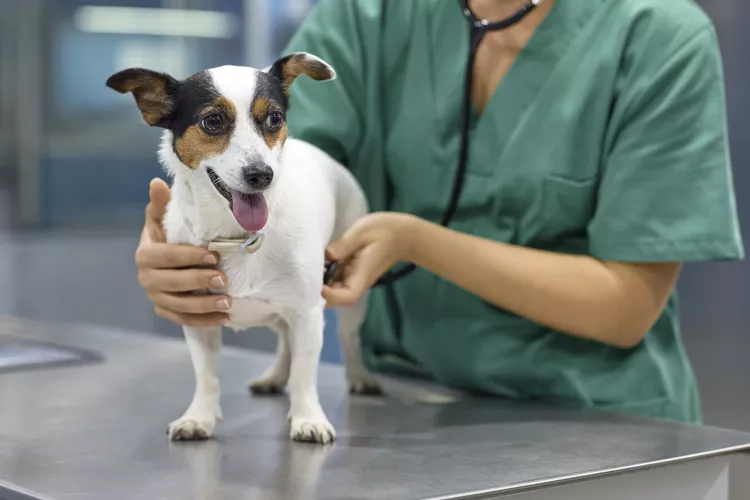Bronchitis in Dogs

Does your dog have bronchitis? This inflammatory condition of the lower airway causes a dog to cough, gag, run a fever, and feel generally unwell. Treatment of bronchitis often depends on the cause of the inflammation, which may be a bacterial or fungal infection. Without treatment of the underlying problem, bronchitis may become a chronic condition.
What Is Bronchitis?
Bronchitis is a term that describes inflammation of the bronchial airways (the lower airways inside the lungs). Because it almost always corresponds with inflammation of the trachea (windpipe), it is sometimes called tracheobronchitis. Bronchitis may also cause inflammation within the lungs. There is generally an acute condition, such as an infection, that triggers bronchial inflammation, but the condition can become chronic due to untreated irritation of the respiratory tissues.
Symptoms of Bronchitis in Dogs
Several signs may accompany bronchitis in dogs, some more common than others. Signs generally become more severe as bronchitis gets worse.
Coughing is by far the most common sign of bronchitis in dogs. Signs like sneezing, nasal discharge, and runny eyes often occur when the dog also has an upper respiratory infection. A fever often indicates infection as well.
When bronchitis is moderate to severe, it can make the dog lethargic and intolerant to exercise. Shortness of breath or rapid breathing may also occur.
Appetite is often decreased when a dog feels unwell. Upper respiratory diseases can impact the dog's sense of smell, making food even less appealing. Not eating makes a dog recover more slowly from illness, leading to a cycle of disease progression.
What Causes Bronchitis in Dogs?
Bronchitis may be acute or chronic. A dog that is coughing for reasons other than bronchitis can develop bronchitis due to the inflammation coughing creates in the airway. This is often the case with dogs that cough due to preexisting airway disease or exposure to inhaled toxins like smoke or chemicals.
Multiple factors can lead to bronchitis in dogs, including:
- Infectious disease (bacterial or viral infections; may be caused by kennel cough)
- Fungal infection
- Inhaled environmental allergies
- Lungworms
- Collapsing trachea
- Pneumonia (can be a cause, a concurrent problem, or a secondary issue)
- Cancer
- Foreign body in the airway
- Anatomical deformities
How Do Vets Diagnose Bronchitis in Dogs?
Chronic bronchitis is suspected when a dog has a persistent cough that continues for two or more months and cannot be attributed to another disease, especially if x-rays show signs of inflammation in the lower airways.
A definitive diagnosis is obtained through a procedure known as a transtracheal wash, or bronchoalveolar lavage, where the dog is sedated and samples of fluid are collected from the lungs to evaluate under the microscope.
How to Treat Bronchitis
Your veterinarian will recommend the appropriate course of treatment for your dog's bronchitis. In acute cases, treatment may only be needed short-term, until the dog recovers. Chronic bronchitis may require ongoing treatment with frequent adjustment of medications.
Warning
Never use over-the-counter medications unless specifically recommended by your vet. They may interact with other medications or impede recovery.
Antibiotics may be prescribed if an infection is suspected or needs to be ruled out.
Corticosteroids are often used to reduce swelling and inflammation in the airway, minimizing coughing. These medications can be given systemically (by mouth or injection) or, for long-term management, an inhaler might be prescribed.
Cough suppressants can reduce coughing and make the dog more comfortable. Because the coughing itself can increase airway inflammation, a reduction in coughing can help a dog recover from bronchitis. On the other hand, too much suppression of coughing may make it difficult for the dog to expel mucus from the airway. Vets often prescribe cough suppressants such as hydrocodone and butorphanol.
Bronchodilators can relax the muscles in the airway, possibly helping air pass more freely. These medications may be injected, administered orally, or given as an inhalant. Common drugs include albuterol, terbutaline, and theophylline.
Nebulization and coupage can help thin out and loosen up secretions in the airway. Nebulization involves the use of a machine that puts out a fine mist of saline that the dog can breathe in. It may or may not have medications added to it. Coupage is often done along with nebulization. It involves patting and massaging the chest to break up congestion and mucus. Your vet's office can show you how to perform nebulization and coupage at home if necessary.
Prognosis for Dogs with Bronchitis
Bronchitis may come on suddenly and improve with treatment if it occurs as a secondary problem to an infectious disease or other disorder of the airways. In many cases, bronchitis is a chronic, long-term condition due to allergies or hypersensitivity of the airways.
How to Prevent Bronchitis
Depending on the cause of your dog's bronchitis, it may or may not have been preventable. Fortunately, there are ways to minimize your dog's risk of developing bronchitis. You can also take measurements to reduce flare-ups of chronic bronchitis.
- Vaccinate your dog against Bordetella bronchiseptica, a bacterium that commonly causes kennel cough in dogs.
- Manage your dog's weight to reduce excess body fat that may put pressure on the chest and airway and make it more difficult for your dog to breathe deeply.
- Reduce exposure to inhaled irritants to avoid inflammation of the airway. This includes smoke, dust, pollen, fragrances, chemicals, molds, aerosols, and anything else that may seem irritating.
Any dog can develop bronchitis, including the chronic form. However, small dog breeds appear to be at a greater risk for chronic bronchitis. If your dog is coughing for more than a few days, be sure to visit your vet for help.